China’s Golden Week holiday revealed a trend of cautious spending as consumers prioritized experiences over material goods. Goldman Sachs analysis showed that domestic spending per trip was about 2% lower than pre-pandemic levels, indicating weak domestic demand and continued consumption downgrading. However, this was an improvement from holidays earlier in the year, which saw a gap of over 10%. The holiday, which marks the founding of the People’s Republic of China on October 1st, saw an increase in bookings for performances and exhibitions, with younger consumers aged 20 to 25 being the main demographic.
The lack of blockbuster movies led to a drop in box office earnings during Golden Week, according to the China Film Administration. Trip.com reported that nearly 30% of travelers booked travel on the same day or one day in advance, showing increased spontaneity among consumers. This shift may be attributed to uncertainty surrounding future income and economic growth due to the ongoing pandemic. Consumers are opting for more affordable travel options and destinations, focusing on experiences they can share on social media rather than expensive purchases.
Appliance sales surged during Golden Week as consumers took advantage of trade-in policies for appliances. Retail sales rose by 9%, with home appliance sales increasing by 149.1%, according to state media. This boost in spending could be attributed to trade-in subsidies for appliances and autos, as well as consumption vouchers issued by local governments. Mainland China recorded 765 million domestic trips during the holiday, an increase from both the previous year and before the pandemic, according to the Ministry of Culture and Tourism.
Overseas transactions by China’s Alipay users saw a significant increase during the first four days of the holiday, with destinations like Malaysia, Korea, Thailand, Hong Kong, and Singapore topping the list. Chinese travelers spent more on entertainment, food and beverage, services, and transportation, rather than shopping. Foreign visitors to mainland China using Alipay spent more than double the amount compared to the previous year, indicating a strong interest in experiences over material goods. The introduction of visa-free travel for more countries and improved mobile payment options have made it easier for foreigners to use apps like Alipay and WeChat Pay in China.
Hong Kong saw an increase in visitors from mainland China during Golden Week, with a daily average of 170,000 visitors, a 27% increase from the previous year. This surge in visitors may be linked to the ease of using mobile payment apps and the introduction of visa-free travel options. Hotels, particularly in Hong Kong, have been adapting to lower prices by offering more experiences such as food and entertainment to attract customers. Overall, the holiday period reflected a shift towards more cautious spending habits and a focus on experiential consumption among Chinese consumers. As brands, both domestic and foreign, adapt to these changing trends, the ability to capture the attention of Chinese consumers will be key to success in the market.

